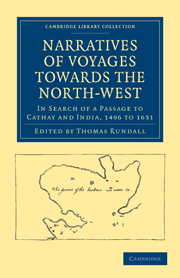 Narratives of Voyages Towards the North-West, in Search of a Passage to Cathay and India, 1496 to 1631
Narratives of Voyages Towards the North-West, in Search of a Passage to Cathay and India, 1496 to 1631 Summary
A period of about three centuries and a half has elapsed since the project of seeking a passage to the eastern hemisphere, by way of the North-west, was first entertained. Henry VII, then reigning in England, earnestly desired to promote maritime enterprise on the part of his subjects; and, under the influence of that feeling, had sought, but failed, to secure the services of Christoval Colon, whose fame, as Christopher Columbus, is universal, and will endure for all time. After the failure of the overture made to Columbus, a Venetian, by name John Cabota, accompanied by his three sons, Lewis, Sebastian, and Sancius, visited this realm; and the high reputation enjoyed by the father, for skill in navigation, and intrepidity as a seaman, caused him to be deemed a welcome visitor, and gained for him a cordial reception. This talented foreigner may be considered to have introduced a new era in the annals of English navigation, and to have originated the idea of an enterprise invested with no ordinary interest: in the prosecution of which, the energies of men of no ordinary character have been enlisted; and for the accomplishment of which, anxiety of no ordinary description is experienced.
Further than this, the accounts of John Cabota are vague and discrepant. He is represented to have made one attempt, or more than one attempt, to explore the North-polar seas; but the record of his proceedings is imperfect; and nothing authentic can be collected, except the simple fact of his having been engaged in the enterprise. Such being the case, the voyage undertaken by his son Sebastian, who proved himself worthy of the name he inherited; will be brought under notice.
- Type
- Chapter
- Information
- Narratives of Voyages Towards the North-West, in Search of a Passage to Cathay and India, 1496 to 1631With Selections from the Early Records of the Honourable the East India Company and from Mss. in the British Museum, pp. 1 - 4Publisher: Cambridge University PressPrint publication year: 2010First published in: 1849
